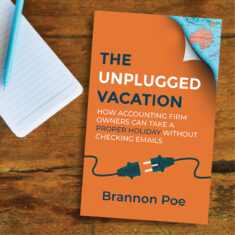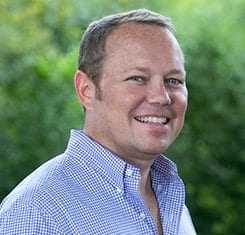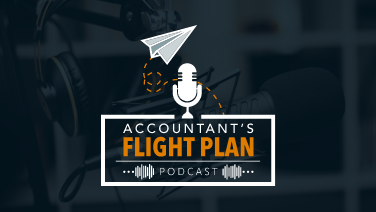This is an excerpt from The Unplugged Vacation. You can download the book for free here.
I think that the real danger of having those “work-horse” mindsets is the road not traveled. People keep these “work-horse” or “start-up” mindsets their entire careers. They do okay. They make a good living. You can make a good living as an owner of a CPA practice. You can work this way until you exit; until you retire, but it doesn’t have to be that way. We talk with CPAs every day, and most of our clients who are selling are doing so in order to retire. It’s the end of their career.
What prompted me to write Accountant’s Flight Plan in 2010 was a dichotomy I saw. There are accountants/owners who were toiling away for years and years and years. They never seem to get out of that same mode of operation, where they’re just working hard their entire career, and the whole business revolves around them.
In contrast, we have some wildly successful clients with a different mode of operation. One where the firm runs autonomously. They keep owner hours low and make sure to stay out of the minutiae of the firm. I have a client right now whose firm is one of the larger and more profitable firms we’ve ever encountered, and he works 5 hours a week. These types of clients have figured out that fewer total hours and less time in the weeds of the practice is what helped them to grow bigger firms.
This mindset helps them make sure they pick the right team members. It helps them make sure they pick the right clients. In the long run, the CPAs we’ve worked with who take time off actually become more successful in their businesses. That has been our overwhelming observation.
The Counter Intuitiveness of Letting Go
The way you start to change is to accelerate the letting go. Forget growth for a minute. Let’s just say you wanted to make the same amount of money, but you want more time. The strategy is the same. You need to let go of some things. Do some real analysis of your practice, analyze where your time goes, and really reflect on one of the things that you don’t like to do. Ask yourself, “Who could do that instead of me?”
Start that process of delegation, even if it’s little things. Let’s say you’re working hard and then you go home on Sunday. You cut your grass, and you do your lawn even though it’s not something you enjoy doing. Well…start there! Hire someone to do your lawn. The key is to START! As I mentioned, you can start this process with really small steps. You’ll get the hang of it. There are wonderful people out there who will mow your lawn or clean your house or clean your office or whatever it is. You can start with the tiniest tasks, but start making those delegations.
Start with the Easy Stuff
Just begin to experience the art of letting go. I have a tool we call the Three-Bucket Tool for Delegation. That’s available for free on our website. If you go to www.accountingpracticeacademy.com and then to our Resources page, you’ll see it. It’s free and incredibly simple yet powerfully effective. In the tool, we have three columns. Column One is “Things that you want to keep.” This is the type of work that you want to keep for the foreseeable future. The next column is “Work that you want to give up one day.” Maybe you want to give it up because you don’t like doing it, but you don’t yet have anybody who can do it in your office. Then there are “Things that you can delegate right now.” It’s simple, but it’s the most effective way to get perspective quickly. Just take an inventory of what you do, categorize it, and delegate. The cool thing about this tool is that you can give it to your key staff and help them re-organize their work as well.
A Story Example
This is an outlier story. We wrote a growth guide, a case study around the CPA who grew his firm from scratch to where it is now… doing over $100 million in revenues with a national footprint. That CPA’s name is Rob Siegfried.
In the growth guide, Rob tells this story about how he had a mentor early in his career. The mentor didn’t have a public accounting background. He was actually a former executive of General Electric.
In spite of his lack of accounting experience, this mentor shared timeless insights into managing/growing a business that Rob took and implemented into his accounting firm. Because of this guidance, Rob eventually delegated himself down to zero billable hours as a managing partner.
Most CPAs think, “Oh, gosh, zero billable hours, how can that be?” It’s an extreme example, but you can literally grow yourself out of all client work and become the managing partner, overseeing the vision of your practice, protecting the practice, and managing change and team development. That’s an extreme example of delegation, but it doesn’t make the principles of delegation any less valid.
Now Rob’s working on the fun stuff, and he enjoys working. There’s nothing wrong with working hard if you enjoy it. He does the things he wants to do, needs to do, and likes to do.
I’d like you to remember you can start really small and work your way up. If you’d like to read deeply about those insights Rob’s mentor shared, you can find the full story on AccountingPracticeAcademy.com/Resources.
This is an excerpt from The Unplugged Vacation. You can download the book for free here.






